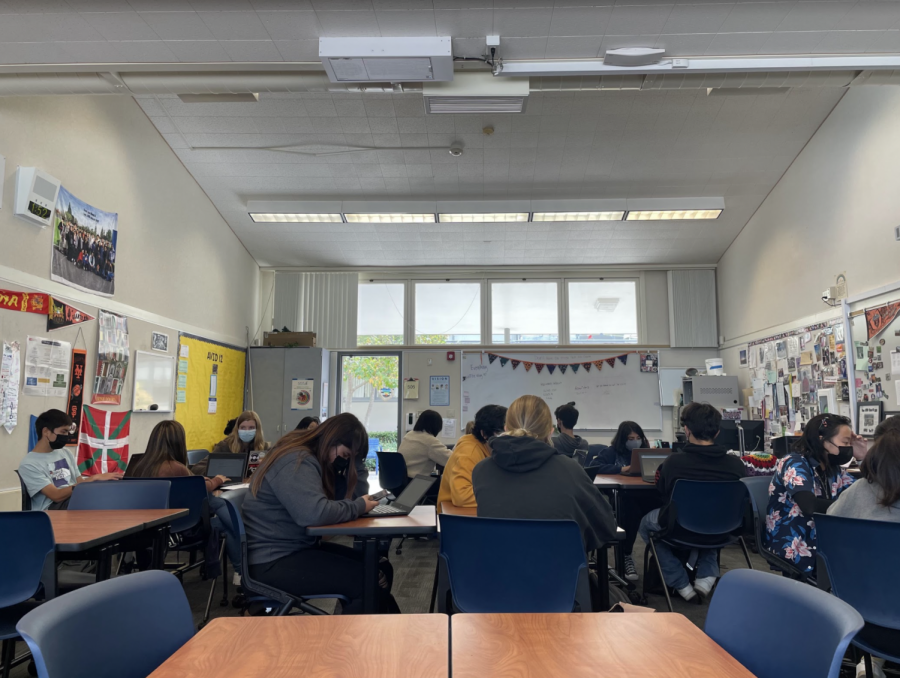New freshman Survey curriculum aims to increase students’ reading interest
A photo of English teacher Arantxa Arriada’s freshman Survey of Composition and Literature class. The new curriculum features a larger focus on free reading, a new unit on student-led book clubs and a revised selection of short stories.
The freshman Survey of Composition and Literature curriculum was reworked this year, featuring a larger focus on free reading, a new unit on student-led book clubs and a revised selection of short stories. This comes after the Survey pilot program ended last year, with many of its elements having been integrated into the main curriculum.
The English Department hopes to change the fact that some students may not read assigned texts in classrooms, according to English Department Coordinator Margaret Bennett. The new curriculum is designed to increase the amount spent reading and a love for literature across all students.
“If you want to be a good basketball player, you can’t just think about being a good basketball player,” Bennett said. “You have to touch the ball, dribble, shoot — you have to do the skills. It’s the same thing with reading.”
The pilot program was modeled after educator Penny Kittle’s novel “Book Love: Developing Depth, Stamina, and Passion in Adolescent Readers,” which emphasizes giving students ample time for free reading. The pilot program ran for three years, beginning in the 2017–18 school year, with four English teachers — Margaret Bennett, Carrie Abel, Susana Herrera and Bruce McCormick. By its final year, the program took up a third of all Survey classes.
“I think [free reading] was one of the fun parts of class because you got to read whatever you want,” said junior Stuart Cash, a former student in the pilot program. “With a lot of reading notes, the class showed me what to look for in passages.”
Seeing growth among students in the pilot class, the Survey team decided last March to integrate some of the program into the main curriculum. While their plans were pushed back a year due to the COVID-19 pandemic, the revised curriculum is in full force this year.
The first unit, which ran during the first quarter, introduces independent reading to students. At the beginning of the year, students pick their own book and are expected to read 30 minutes at their own pace between classes. As evidence of reading, students take notes and have a teacher-student book conference at the end of the unit.
Freshman Ava Cheng feels that the free reading has been an enjoyable experience, but sees minor flaws in the way it is structured.
“I feel like it would be a great idea if we had more time to pick [and research] a book because the first book I read, I didn’t enjoy that much,” Ava said.
Students also read short stories in the first unit with a larger selection of 25 texts. Each teacher chooses anywhere from two to five short stories to analyze in their classrooms. Many of the texts are new from past years in an effort to develop students’ reading comprehension levels
“We realized that some of the short stories we used to teach that are tried-and-true were now being read in middle schools and so forth,” Bennett said.
For freshman SJ Ly, these short stories have been engaging and teachers are supportive throughout their lessons.
“I actually enjoyed reading the short stories and taking annotations and writing essays,” SJ said.
At the end of the first semester, students will have a poetry unit with an independent reading focus, similar to the previous curriculum.
Second semester will include a new book club unit, where students will pick one book from ten choices and split into smaller groups of students. Each group will have their own reading calendar and discussions, but the unit will also be supplemented by taught material on a theme — such as fear or courage — that students will connect to their own books.
“The book club was highly successful [in the pilot program],” Bennett said. “The kids loved the unit, they really grew on the discussion skills and it was great to see them do the synthesis skills as well.”
Since these groups are ultimately student-guided, there are both benefits and drawbacks, according to Stuart.
“I think the book clubs went pretty well, except a lot of the discussion was hard if somebody didn’t read,” Stuart said.
These new changes to the Survey curriculum don’t mean assigned novels aren’t still a part of the curriculum. Students are currently reading Cristina Henríquez’s “The Book of Unknown Americans,” which is a new addition, and next semester students will read William Shakespeare’s classic “Romeo and Juliet.”
While Bennett and other teachers are supportive of the new curriculum, they are prepared to continue to revise it and adapt to students’ needs.
“This District has a value of continuous improvement,” Bennett said. “We’re constantly reflecting on what we’re doing, how we’re doing it and how it could be better.”




